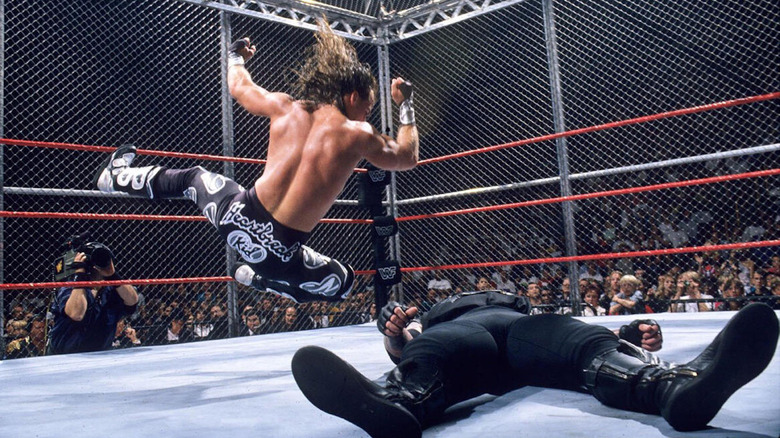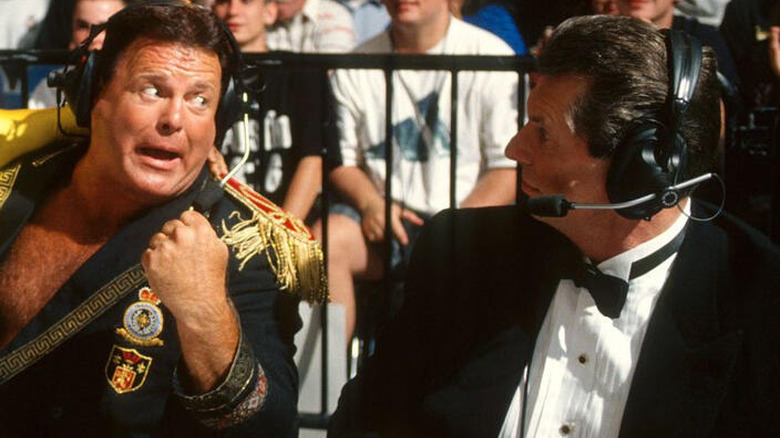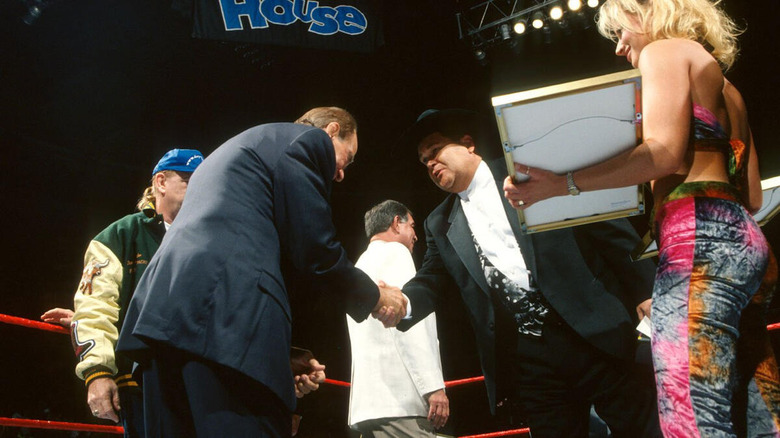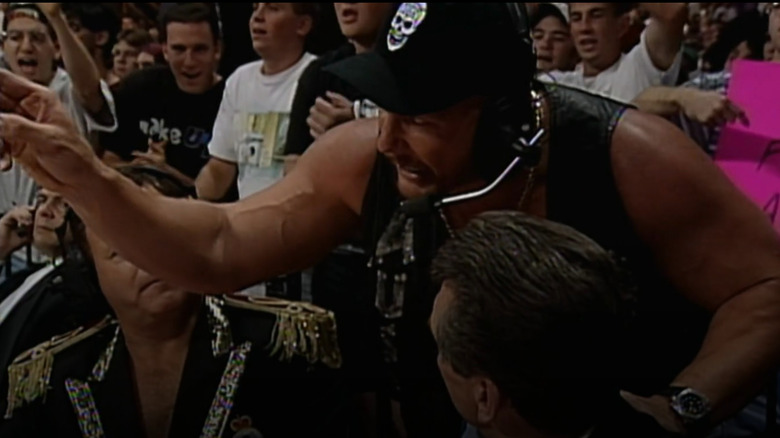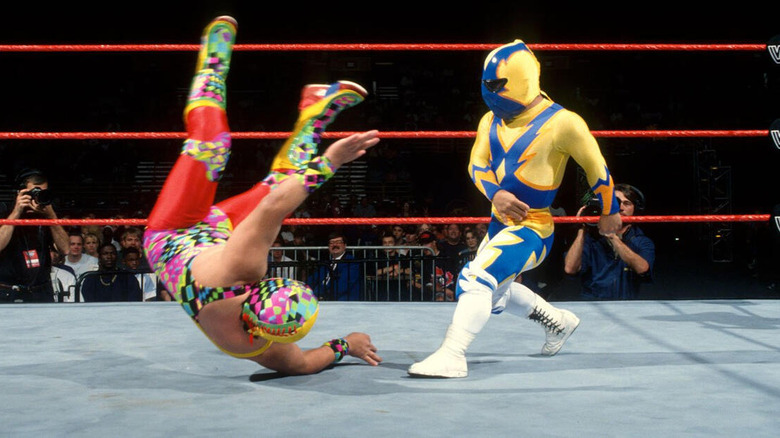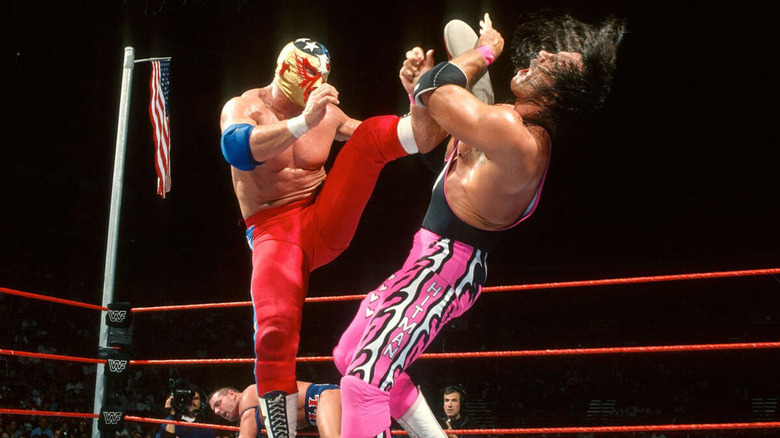WWF Badd Blood 1997: 3 Things We Hated And 3 Things We Loved
Welcome to Wrestling Inc.'s first-ever retro review, in which the WINC staff re-watch a wrestling event from the past and apply our traditional loved/hated format! And with the revival of the Bad Blood just a few weeks away, what better way to begin than with the original Badd Blood, which was so extreme they had to put an extra "d" on the end of the "Bad" part?
Among the more newsworthy pay-per-views of The Attitude Era, Badd Blood was part of the "In Your House" brand of shows and took place on October 5, 1997, 27 years to the day prior to the upcoming 2024 event. It's famous for introducing Hell in a Cell, a match concept so enduring that there hasn't been a year without one since 2001 (to put it another way, Badd Blood's main event was the very first Hell in a Cell match; CM Punk and Drew McIntyre will shortly participate in the 53rd). But it's more than just that — Badd Blood also ends with the debut of The Undertaker's demonic brother Kane, who would go on to become world champion and a fixture of WWE programming for decades. The historical context of the show also makes it fascinating to watch; Badd Blood takes place at the very beginning of the Vince McMahon/Steve Austin feud, as McMahon was starting to openly portray himself as the owner of the company. One month after Badd Blood, the Montreal Screwjob would occur and WWF's mild-mannered play-by-play guy would transform into the on-screen villain known as Mr. McMahon. If that wasn't enough, Badd Blood also took place the day Brian Pillman died; his planned match with Dude Love was scrapped and the card was thrown into last-minute chaos.
As always, since we generally limit ourselves to six entries per show (three loves and three hates) this is not going to be a comprehensive review. We're only working with the stuff that gave us the strongest feelings, positive or negative, so there's a ton going on here that we're not going to talk about. If it makes you feel any better, you're not missing much — The Nation of Domination needed a distraction finish to win a handicap match against The Legion of Doom, The Godwinns won the tag team championship from The Headbangers which tells you all you need to know about the state of the tag division, and there was a match between The Disciples of Apocalypse and Los Boricuas, aka the winners of the Wrestling Observer's 1997 Worst Feud of the Year award. We think you'll agree there are far more interesting things here to discuss. With that in mind, here are three things we hated and three things we loved about WWF Badd Blood 1997!
Hated: Vince McMahon and Jerry Lawler on commentary
There are a lot of issues with wrestling today, whether it be the contortion of its rudimentary rules or everyone being impervious to finishing moves, but one thing I will be leaving Badd Blood with is an undoubted appreciation for modern day commentary. Michael Cole actually appeared during Badd Blood as the very fresh-faced, goatee sporting backstage interviewer, as well as delivering hilariously unfunny deadpan voice-overs in video packages, but at the booth, live, calling each play — albeit loosely — was the team of Jim Ross, Jerry Lawler, and Vince McMahon.
This was a much different time. Ross was effectively drowned out by the obtuse contrarian in Lawler, who at one point even bemoaned JR highlighting a wrestlers' Tae Kwon Do background, trying to get off a dig at martial arts before being drowned out himself by McMahon. Each match was a battle royal for the ears, with McMahon and Lawler each trying to get their material in around the goings on, like two drunk uncles at a party they have no business attending. But the lack of cohesive commentary became alarmingly clear when Kane made his eventual appearance in the main event.
"That's gotta be Kane," Vince spluttered several times, looking to dump exposition rather than following the narrative process. He could have left the moment to breathe, allowed for the audience to come to the realization that this was the character the WWF had been teasing. But this was McMahon's idea and he'd be damned if he didn't let the uninitiated know about it. It was indeed Kane, and it's one of the greatest debuts in history, but watching it with the live play-by-play felt like replaying a nostalgic video game only to find the controls are uber clunky. There wasn't a single moment where I felt appreciative of commentary's ramblings, where I found them insightful or even mildly entertaining. Commentary should add to the wrestling; bad commentary takes away from it. Sometimes you realize the video games you have now are fine, actually.
Written by Max Everett
Loved: An accurate history lesson from the WWF
If there's one thing that we've come to learn from WWE over the years, it's that they are in charge of the history books. Sure, they'll give credit where credit is due at times, but when it comes to looking over the years gone by in professional wrestling, there always seems to be a sense that WWE saved the day and everyone who worked for them lived happily ever after.
Badd Blood was a notable exception. After a three-match stretch to start the show that was about as exciting as a game of cricket in slow motion, Jim Ross and Sunny hosted a segment where they celebrated the wrestling legends of St. Louis, where Badd Blood took place. Each man came complete with a detailed video package narrated by the leaked version of Michael Cole before he was set for worldwide release, and not only did everyone get their accolades read out almost in full, WWE decided to keep in all of the small details that the most loyal fans at the time would appreciate.
All Japan Pro Wrestling founder Giant Baba received a mention when talking about Jack Brisco. Terry Funk was credited for being as popular in 1997 as he ever was, with ECW being noted for his most recent work at the time (this show took place two months after Funk's hellish Barbed Wire match with Sabu), and Sam Muchnick was credited as one of the greatest and most important promoters of all time. That last part is especially noteworthy because Vince McMahon, the man who invented WrestleMania, took wrestling mainstream, and put Muchnick's NWA out to pasture, is literally sitting at ringside while the whole thing is taking place.
Lou Thesz, Harley Race, Dory Funk. Jr, and Gene Kiniski rounded out the cast of legends who rightly got a standing ovation from the St. Louis faithful in what was by far the most wholesome portion of the entire night. WWE didn't need to do this. I mean, they might have because some of the matches were so short, but they didn't really need to give pay-per-view time to a segment where legends from the past stop to say hello. The fact that they did brought a smile to my face that I didn't expect. So good job WWE, this was nice.
Written by Sam Palmer
Hated: Austin hijacks commentary
In the only singles title match of the evening, Owen Hart battled Faarooq (aka Ron Simmons) for the vacant Intercontinental Championship. "Stone Cold" Steve Austin had previously won the title by defeating Hart at WWE SummerSlam, but was later forced to relinquish it after a botched Tombstone Piledriver resulted in temporary paralysis and a bruised spinal cord.
Fast forward two months, Hart, the man who delivered the aforementioned piledriver, was now in the finals of the Intercontinental Championship tournament at Badd Blood, with Austin at ringside per the request of Commissioner Slaughter. In the wake of his injury at SummerSlam, Austin adopted a more aggressive and chaotic attitude — one that came to the forefront during this appearance.
On paper, Owen Hart vs. Faarooq seemed to be a promising blend of in-ring styles, with Hart bringing forth a technical approach, while Faarooq stood strong as a powerhouse. Unfortunately, that promise was immediately washed away by the arrival of Austin. For the first 75 seconds of the Intercontinental Championship match, Hart was distracted by a trash-talking Austin, who hijacked the commentary headset of WWE owner Vince McMahon. Once the action between Hart and Faarooq finally commenced in the ring, Austin briefly took hold of the headset belonging to Jerry "The King" Lawler.
Following Austin's interruptions, McMahon, Lawler, and Jim Ross attempted to steer the viewer's attention back to the in-ring action as Hart targeted the leg of Faarooq. Meanwhile, Austin wandered over to the Spanish announce table, took another headset, and accused one of the commentators of trash-talking him in Spanish. Moments later, Austin moved on to the French announce desk, threatening to "knock the French right out" of one of its personalities. As Ross subsequently pointed out, despite there being a split screen during this time, Austin had also once again taken the focus off the ongoing Intercontinental Championship match.
Now, don't get me wrong — it is completely in the nature of Stone Cold, the epitome of "IDGAF," to stir up chaos. In this case, though, it was at the expense of a championship match (again, the only singles title match on the show) that many were probably looking forward to. This same "IDGAF" mentality also proved to be the catalyst for the match's (slightly confusing) finish, which saw Austin strike Faarooq with the title belt, allowing Hart, the man who injured Austin, to regain the Intercontinental Championship.
Written by Ella Jay
Loved: Minis wrestling is awesome
After re-watching Badd Blood, I'm going to be hyper-fixating on minis wrestling while I ride out the dopamine released by one of the most fun matches on the card. It wasn't exactly under the greatest circumstances for the four luchadors called into action on late notice, performing in the shadow of the disturbing news that Brian Pillman had been found dead merely an hour before the show, but this somehow ended up one of the better Badd Blood matches.
I must say I wasn't expecting this to stay with me past the Hell in a Cell match, let alone become one of the standout moments of the show, but it's a testament to the work of Max Mini (Tzuki), Nova (Mascarita Sagrada), Mosaic (Octagoncito), and Tarantula (Espectrito) working against both generalized ignorance towards little people and the situation under which their match took place. There was audible laughter at the most mundane of spots, and having both Jerry Lawler and Vince McMahon offer the collective sensitivity of a brick to the face on commentary wasn't helping things. Still, the match was unabated fun as a watching experience, even if it wasn't better than minis wrestling that gets the care it deserves. That fact even somewhat played into how well this turned out — the wrestlers were being treated as a hokey attraction, but the absence of the weight of expectation allowed them to play with ideas. There was the flamboyant technicality of lucha libre, the pantomime slapstick of a theme park attraction, and a surprisingly rapid rate of execution on each move. It was fun, and that is truly when wrestling is at its best.
Written by Max Everett
Hated: How To Ruin A Stipulation 101
With the Hell in a Cell match taking center stage, WWE Champion Bret Hart was positioned in the co-main event, where he would team up with The British Bulldog to take on Vader and The Patriot in a Flag Match. Usually a Flag Match, at least in modern versions of the stipulation, plays out as a regular contest where the winner would raise their flag proudly at the end of the match. On some occasions, it plays out much like what I like to call a "Vince Russo Special," where the aim is to take the flag from a pole strapped to the ring post. Individually, they are both fine, if a little unspectacular. So what happens when both of those things are combined? You get this.
This was a match that, had it been one or the other (preferably the non-capture the flag version) when it comes to the stipulation, would have actually been a very good match. You have Bret and Vader, who are great, Bulldog, who can be very good when he wants to be, and The Patriot, who was also there. You don't need to overcomplicate things, and yet they did. To prove how stupid the stipulation is when the capture-the-flag part of things gets dumped on top of a regular Flag Match, let me describe the start of the match.
The two teams brawl before the bell, using anything they can get their hands on to beat each other up. The crowd is alive, everything is going well, and the heels end up coming off worse than the American babyfaces, who stand tall in the ring while the heels bail to the outside. Then the bell rings, the match is officially underway, and the babyfaces, Vader and The Patriot, STAND THERE AND DO NOTHING! Vader, Patriot: your flag is right there! Bret and Bulldog are halfway up the ramp, all you need to do is climb the ropes, take the flag, and you win, easy money! But no, they just start jaw-jacking, and Bret ends up pinning The Patriot with regular wrestling moves. The end.
Like I said, the match could have been good, and if it was a regular tag team match, it probably would been, but the stipulation turned it into a big mess. In fact, the only thing messier at the end of it all was my entire reality after The Patriot walked out to Kurt Angle's entrance music.
Written by Sam Palmer
Loved: The devil debuts alongside his playground
While WWE has more than 50 Hell In A Cell matches under their belt as of writing and is getting ready to do another one between Drew McIntyre and CM Punk, none will arguably be as iconic as the very first one between The Undertaker and Shawn Michaels, with a shot at the WWF Championship hanging in the balance. We may be used to seeing the use of weapons in the modern age of Hell In A Cell matches, but seeing Michaels and The Undertaker do it for the first time with the employment of chairs, the ring steps, the camera man going down thanks to a strike from Michaels, and of course, Michaels falling off the top of the cage itself, makes for a fun and entertaining watch.
I (and likely many others) would argue that with the amount of action already happening in the match, the debut of a new superstar wasn't necessary. However, very few wrestler debuts can truly withstand the test of time, and Kane's is one that will. Everything about it was and will always be iconic, from his eerie appearance and mysterious aura to him tearing the door straight off the cage to the foreshadowing with the pre-match check under the ring for anyone who could be lurking and the noting of the lock being tight on the cage during the match (of course prior to officials entering to check on the camera man that Michaels had taken down).
Sometimes we use the phrase "overbooked" to insult a match. In this case, it's a compliment. The first Hell in a Cell was beautiful absurd chaos, and we can only hope to get the same from Punk vs. McIntyre.
Written by Olivia Quinlan
